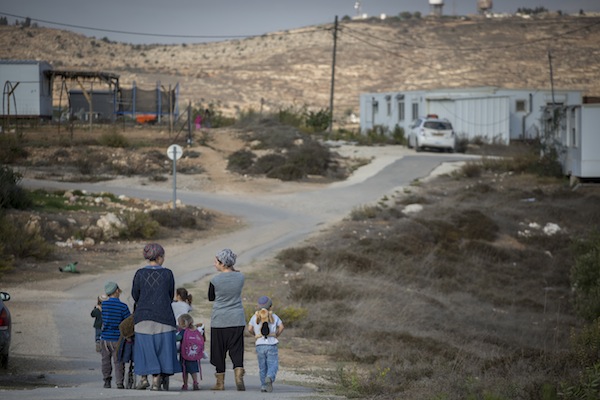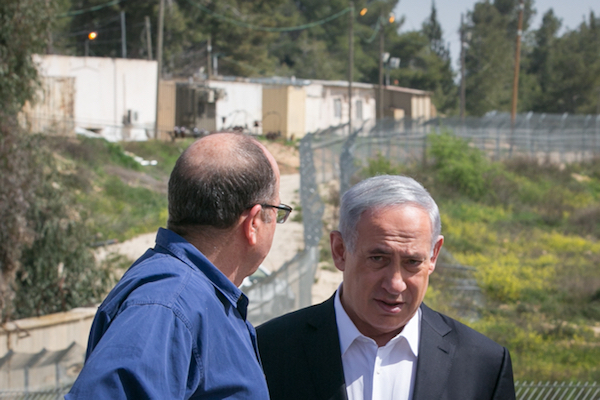The Israeli government is working tirelessly to retroactively legalize over 100 illegal West Bank outposts. They’ll probably get away with it. Is that such a bad thing?

The biggest story in Israel this past week — bigger than Trump or Aleppo — was the impending eviction of the illegal settlement outpost of Amona, and parallel efforts by the Israeli government to save dozens of others from the same fate.
What is an illegal settlement, you ask? Aren’t all settlements illegal under international law? Aren’t all Israeli settlements built on Palestinian land? The answer to the last two questions is yes, but the so-called illegal settlement outposts are illegal even under Israeli law. They were built without explicit government or military approval, and many sit on land privately owned by Palestinians — without the landowners’ permission.
That’s what happened in Amona. The settlement was built on privately owned Palestinian land, and the landowners went to an Israeli court to get their land back — and won. The court gave the government several years to carry out the eviction, partly due to the fact that the last time Israel evicted Amona, security forces encountered violent resistance from settlers. Now the deadline is just a few weeks away.
Israel’s most right-wing, most pro-settler government ever knows it lost this fight. But in order for Netanyahu to keep the right flank of his coalition by his side, he is playing along with their efforts to leverage the Amona “loss” to save the 100 or so other settlement outposts that could face similar court-ordered evictions.
That effort has primarily manifested as a proposed law called the “formalization law,” sometimes translated as the “normalization law.” In reality, it is a piece of legislation that would retroactively legalize the theft of privately owned Palestinian land. Netanyahu’s own attorney general has said he cannot defend such a law in court, but for political reasons the prime minister is letting his coalition partners run wild.

But wait. If all settlements are illegal under international law, and they are all built on Palestinian land, then what does it matter what Israel calls them? Well, there’s a pretty strong argument to be made that it doesn’t matter at all, and that just by acknowledging the concept of “illegal settlements” we are insinuating that there are legal settlements. There are not.
Yet there is still a case to be made for engaging with the Israeli government’s game of semantics over legal and illegal settlements. The reason is practicality: save what you can. The case for fighting to keep the “illegal” settlements illegal under Israeli law is a limited effort, albeit likely in vain, by the traditional pro-two-state, peace camp movement to stave off the settlement movement’s unchecked expansion and ultimate goal: undermining any chance of Palestinian statehood in the occupied territories.
Geographically speaking, the vast majority of the so-called illegal settlement outposts are located outside of what Israel has defined the “consensus settlement blocs.” These are areas that Israeli leaders, and the majority of the Jewish population, have convinced themselves will remain under Israeli control in any negotiated two-state solution.

I have argued in the past that the very concept of “consensus blocs” should be rejected outright, and that so-called consensus settlements bear far more responsibility than rogue outposts for the entrenchment of Israel’s military occupation. Focusing on the smaller outposts is merely a sleight of hand to distract from the permanence and magnitude of more mainstream, larger settlements. In fact, the first eviction of Amona, 11 years ago, was part of Ariel Sharon’s gambit to save the greater settlement enterprise by sacrificing the less-important, and less “legal” settlements.
Mainstream Israeli supporters of the West Bank settlements fear that by legalizing the illegal settlements, the distinction between the two will disappear, thereby delegitimizing the entire settlement enterprise. On a theoretical level, that can only be a good thing for opponents of Israel’s settlements: the sooner the legal web Israel has built to support its settlements and maintain the occupation begins to disintegrate, the sooner the entire enterprise will collapse. The more brazen and belligerent Israel acts, the argument goes, the higher the likelihood of international pressure on Israel to end the occupation.
Benjamin Netanyahu appears to think otherwise. Whereas just a few weeks ago the prime minister was warning that “unwise conduct” in the final months of the Obama administration could “endanger the entire settlement enterprise,” he now appears to no longer give a damn. The threat of yet another UN Security Council resolution condemning Israeli settlements just doesn’t seem to phase him anymore.
Perhaps it’s the imminent prospect of blind support from a Trump administration and Republican-controlled Congress. Or maybe Netanyahu is convinced that the world is too preoccupied with Syria and ISIS and Yemen and the collapse of liberal democracy to do anything about what ultimately amounts to not much more than a minor change in the way Israel steals Palestinian land. He’s probably right.


